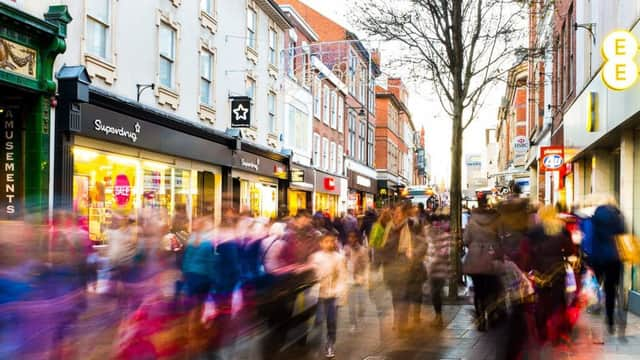Confidence falls as consumer squeeze intensifies - Danske


The Northern Ireland Consumer Confidence Index decreased from 141 in 2017 Q1 to 139 in July 2017 and indicates that households’ expectations of how their financial position will change over the next twelve months fell by six points compared with 2017 Q1.
“A consumer squeeze has gripped the UK and the local economies and this was likely the main driver behind the fall in consumer confidence in July,” said Danske Bank economist Conor Lambe.
Advertisement
Hide AdAdvertisement
Hide Ad“Factors such as Brexit-related uncertainty, which seems to have increased further following the general election, and the continued political impasse in Northern Ireland are also likely to have acted as a drag on confidence levels.”
Compared with the first quarter of 2017, the component of the index that examines how consumers feel about their current financial position compared with a year earlier fell by three points.
Broadly speaking, younger people feel more positive about their current financial position than older people with 24% of 16-24-year-olds and 35%of 25-34-year-olds believing their finances have improved over the last year.
However, 21% of 35-49-year-olds, 28%of those aged 50-64, and 18% of those over 65 think that their current financial position is worse than it was last year.
Advertisement
Hide AdAdvertisement
Hide Ad“Over the first six months of 2016, the average inflation rate was 0.4 per cent,” said Mr Lambe.
“Over the same period this year, inflation averaged 2.4%. This high inflation has led to falling real wages and is exerting downward pressure on consumers’ purchasing power. In this environment, a fall back in consumer sentiment around current finances was to be expected.”
Household expectations of how their financial position will change over the next 12 months decreased by six points in July 2017, compared with 2017 Q1.
Full-time workers feel more confident about their future finances than part–time workers with 22% in full-time posts expecting their finances to improve, compared with 14 per cent who expect to become worse off.
Advertisement
Hide AdAdvertisement
Hide AdOnly nine per cent of part-time workers believe their financial position will improve over the next year and 15 per cent think it will get worse.
“Inflation is forecast to remain above target over the rest of 2017 and into 2018,” said Mr Lambe.
“Wage increases are unlikely to be sufficient to push real earnings growth well into positive territory. Therefore, the squeeze on consumers is expected to continue and the fall in this part of the index suggests that households in Northern Ireland recognise this to be the case.”
On a brighter note, expectations around job security increased by two points in July, as 10% of those surveyed expect to become more secure in their job over the next year, with six per cent less sure.
Advertisement
Hide AdAdvertisement
Hide AdThe majority of consumers do not expect their job security to change. In the west region, 83 per cent of consumers aren’t anticipating any changes in job security. This proportion stands at 74 per cent in the south region and 70 per cent in the north. In Belfast City, 67 per cent of people expect job security to remain the same.
Just over 22% of consumers expect to spend more on expensive items over the next year while 18% expect to spend less.
The part of the survey that examines households’ expectations of how much they will save in the next twelve months experienced a fall of seven points in July 2017.